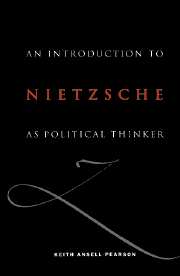Book contents
- Frontmatter
- Contents
- Acknowledgements
- Note on the texts and abbreviations
- Chronology of Nietzsche's life
- Introduction
- A note on Nietzsche and liberalism
- I THE QUESTION OF NIETZSCHE
- II ANCIENTS AND MODERNS
- III MAN AND OVERMAN
- IV THE QUESTION OF NIETZSCHE NOW
- 8 Nietzsche and contemporary liberalism
- 9 Nietzsche and feminism
- 10 The perfect nihilist
- Notes
- Bibliography
- Guide to further reading
- Index
8 - Nietzsche and contemporary liberalism
Published online by Cambridge University Press: 10 November 2009
- Frontmatter
- Contents
- Acknowledgements
- Note on the texts and abbreviations
- Chronology of Nietzsche's life
- Introduction
- A note on Nietzsche and liberalism
- I THE QUESTION OF NIETZSCHE
- II ANCIENTS AND MODERNS
- III MAN AND OVERMAN
- IV THE QUESTION OF NIETZSCHE NOW
- 8 Nietzsche and contemporary liberalism
- 9 Nietzsche and feminism
- 10 The perfect nihilist
- Notes
- Bibliography
- Guide to further reading
- Index
Summary
The central issue for political theory is not the constitution of the self but the connection of constituted selves.
Michael Walzer (1990)INTRODUCTION
In this chapter I will take a look at the work of two contemporary philosophers who have tried to face up to Nietzsche's challenge and sought to utilise his ideas in the service of a redefined and radicalised liberalism. The two examples I have chosen are, firstly, the work of Richard Rorty, who has accepted the basic import of Nietzsche's critique of Western metaphysics that truth is a fiction and that modern human beings have to construct their lives without the support of either eternal truths or absolute values, which has led him to advocate what he calls a ‘liberal ironism’; and, secondly, the work of William Connolly who, under the influence of the work of Michel Foucault, has argued for a ‘late-modern’ conception of liberal politics based on a synthesis of Nietzschean insights into modernity and an independent theory of justice. The ‘radical liberal’ describes someone who wishes to uphold the traditional liberal values of toleration, autonomy, individuality, and free expression, but who wishes to avoid positing a spurious universalism by relying on an inclusive ideal of human nature. The problem of politics for the radical liberal is that of how to institute a society which has a shared ethical life, but which allows for the recognition of otherness and the affirmation of difference. This concern with otherness and difference is also shared by feminist writers and will be examined in the next chapter. The work of these two thinkers shows how fertile Nietzsche's ideas can be for rethinking the political today.
- Type
- Chapter
- Information
- An Introduction to Nietzsche as Political ThinkerThe Perfect Nihilist, pp. 165 - 179Publisher: Cambridge University PressPrint publication year: 1994



